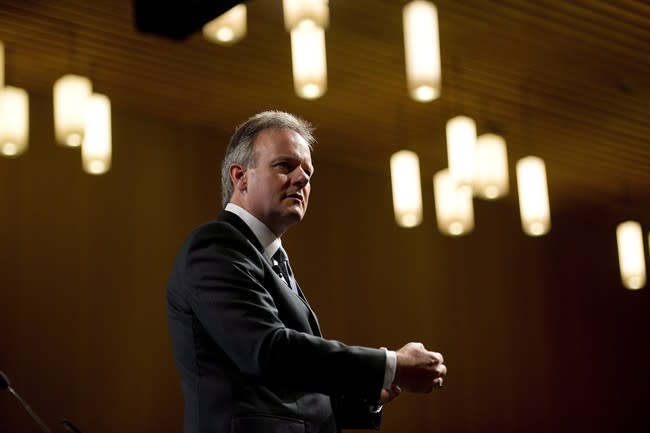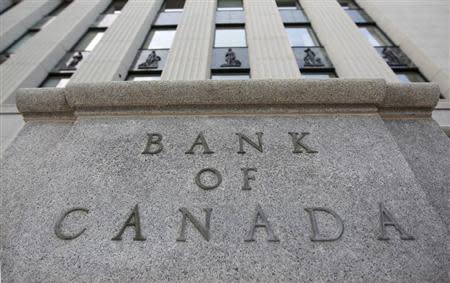Bank of Canada drops rate-hike talk, sees slower growth
By Louise Egan and Randall Palmer OTTAWA (Reuters) - The Bank of Canada abandoned on Wednesday 18 months of warnings that interest rates will one day have to rise in a sharp policy shift that highlighted weaker-than-expected growth and inflation and pushed the prospect of higher rates further into the future. The bank's surprise move knocked the Canadian dollar to a one-week low and sent bond prices higher as traders scaled back bets on a rate increase late next year. The central bank held its key interest rate at 1.0 percent, its level for more than three years. But for the first time since April 2012, when the Bank of Canada became the first in the Group of Seven rich nations to introduce a rate-hike bias, it dropped any mention of eventual rate increases, or in the words it used in September, a "gradual normalization" of rates. Inflation has been below the bank's 2 percent target for the past year and a half, and that means that "downside risks to inflation assume increasing importance," the bank said in its third rate decision under its new governor, Stephen Poloz. "However, the bank must also take into consideration the risk of exacerbating already-elevated household imbalances," it said, a reference to the soaring debt load of Canadian households. "Weighing these considerations, the bank judges that the substantial monetary policy stimulus currently in place remains appropriate and therefore has decided to maintain the target for the overnight rate at 1 percent." The Canadian dollar weakened after the news to C$1.0374 versus the U.S. dollar, or 96.39 U.S. cents, weaker than Tuesday's close of C$1.0289, or 97.19 U.S. cents. Derek Holt, economist at Scotiabank, said the bank's change of stance was long overdue but said the bar was very high for it to cut rates. "The bank, by dropping the rate-hike bias, is going to invite markets to lean in that direction (of rate cuts)," said Derek Holt, economist at Scotiabank. "All they're doing here is playing out the very, very prolonged pause, longer than the markets had been assuming," he said. After the bank's statement, overnight index swaps, which trade based on expectations for the central bank's policy rate, showed traders slashing their bets that rates will rise late next year and pricing in a small chance of a cut before then. EXPORTS DISAPPOINTING Canada's economy bounced back relatively quickly from the 2008-09 recession but has been powered largely by consumer spending and a heated housing market Poloz, who left his job as head of the country's export development agency to head the central bank in June, had initially been optimistic that exports, and then business investment, would take up the baton. He acknowledged this month in Washington that the performance of both has been disappointing. The weakness in the economy means it won't return to its full production capacity and inflation won't rise to the bank's 2 percent target until the end of 2015, the bank said, six months later than it had forecast in a report in July. The median forecast by more than 30 analysts in a Reuters poll last week was for the bank to start raising rates in the fourth quarter of 2014. Of those who perceived the bank to have a tightening bias, none expected it to drop that bias or forgo a nod to a future rate increase. "A move wasn't viewed as imminent, but that policy statement pushes out any expectation of any rate hikes further into the future, and that weighs on the Canadian dollar," said Paul Ferley, assistant chief economist at Royal Bank of Canada. The central bank cut its growth and inflation estimates across the board. It reduced its third-quarter growth forecast to an annualized 1.8 percent from 3.8 percent; fourth quarter to 2.3 percent from 2.5 percent; and growth for 2014 to 2.3 percent from 2.7 percent. The bank also cut its outlook for U.S. growth in the second half of this year. While its overall forecasts for global growth were little changed due to positive surprises in the euro zone, Japan and China, it said the composition of that growth was slightly less favorable to Canada, which ships most of its exports to the United States. "Weaker growth in U.S. output in the near term, particularly in business and residential investment, will dampen Canadian exports relative to what had been expected in July," the bank said. Despite its expectation of a soft landing in the housing market and a stabilization of household debt, the bank highlighted the risk of a housing correction down the road if the market strengthens further because of low borrowing rates. (Additional reporting by Leah Schnurr, Cameron French and Andrea Hopkins; Editing by W Simon, Jeffrey Hodgson and Peter Galloway)

 Yahoo Finance
Yahoo Finance 

